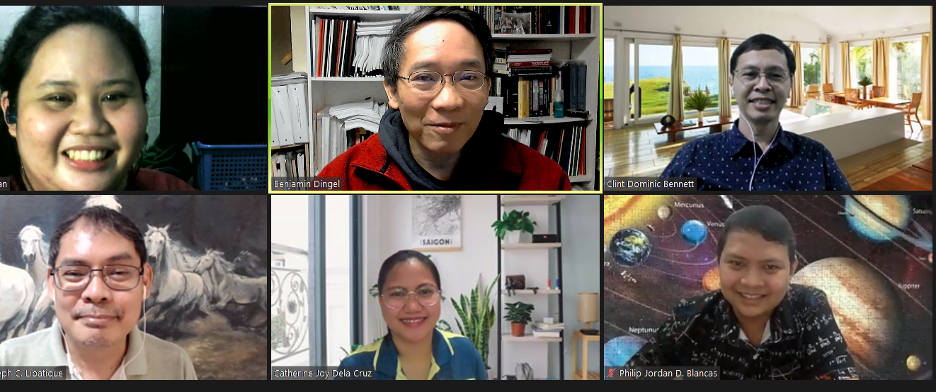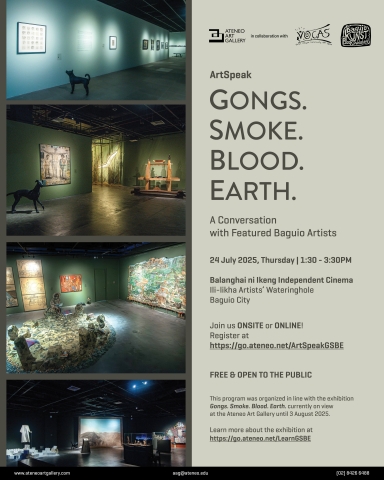Ateneo ROSES Lab: Taking time to “smell” ROSES in research
28 Feb 2022 | Keisha Lorraine Lamasan
The Ateneo Research on Optical Science, Engineering and Systems (ROSES) Lab is one of the 7 official research groups under the Department of Physics. It was with the Ateneo Innovation Center (AIC) before it moved to the Department of Physics last January 2020. Dr Benjamin Dingel, an affiliate professor at the Department of Physics, an ARISE Research Fellow, and a Senior Research Scientist with AIC, conceptualized the lab in 2017, established it, and operated it ever since remotely from New York, USA, nearly three years before the Covid-19 pandemic. Historically speaking, the lab is probably the first “purely-online physics research group” in Ateneo. Dr Dingel serves as the lab's research head.
In an online interview, he shared how the Ateneo ROSES Lab started, how it is operated, and how it contributes to scientific research despite the online environment. He was accompanied by members of the ROSES Lab team- D. Nathaniel Libatique, Associate Professor and a Laboratory Head in the Department of Electronics, Computer, and Communications Engineering (ECCE); Mr Clint Bennett, Instructor, Department of Physics and Co-Head of the SED-UAD Research Lab of the Manila Observatory; and Ms Cathy Dela Cruz and Mr Philip Blancas, both faculty members of the Department of Physics. Mr Carlos Oppus, Assistant Professor of ECCE, and member of the ROSES team was not able to attend the online interview.
In 2017, Dr Dingel started collaborating purely online with some Physics and ECCE faculty members and mentoring Physics undergraduate students working on their research. "We are a publication-driven research group, and we are educating students through research (the education-by-research model of learning). So, the way to and the ability to do research is important for them to learn," added Dr Dingel.
According to the team, the primary aim of the lab is to increase the research publication of the undergraduate and graduate students, and faculty members specifically in the fields of optics, photonic devices, physics, optical sensing, mathematical physics, microwave photonics, and STEM education.
As Dr Libatique said, "The DNA of the group is a very keen interest to work with the students as early as possible so that they can get a direct experience of how to do publication-quality research." The youngest ROSES members to publish have been junior-year BS Physics students. However, to introduce members early to the group’s culture and manner of proceeding, ROSES opens its membership to sophomores and even first-year students.
The lab works by having mentors guide both undergraduate and graduate students studying Physics, Engineering, and other related courses in conducting their research and publishing their findings.

They are consistently working with as many students as possible and participating in research grant competitions to gain funding to further their research and development.
ROSES Lab's setup is heavily influenced by the experiences and backgrounds of the mentors. Collectively, the faculty advisers have had more than 8 man-decades of experience doing research and development in academic, government, and industrial environments, in both tech startup and big enterprise contexts in the Philippines, Japan, and the United States. Once a week, students have to give an update on their research with their mentors providing the necessary feedback.
But it is not all research work at the lab. The team also emphasized the importance of camaraderie, fun, and solidarity. As part of building their team culture, the students are encouraged to share personal hobbies and activities during the weekly meet.
Lenz Dagohoy, a BS Physics student, and Avram Gutierrez, an MS Physics student, shared their experiences in the ROSES Team. Dagohoy is one of the two students who won the DOST-Young Innovators Program research grant competition (together with David Bambalan, 3 BS APS-MSE). She said, "ROSES experience is something I'm always thankful for because it's not always limited to Physics research. I get exposed to different fields as well. It gives me a lot of experience to try to see how I'm doing and how to move forward."
Being a member of the ROSES Lab allows students to learn and explore different fields while doing research. When asked how mentoring and doing research with the ROSES team influenced them, Gutierrez said it helped him carve his personal and professional path. Both acknowledged that the open line of communication with their mentors and other team members was instrumental in allowing them to open and share their thoughts and plans.
To promote collaboration, cross-skilling, and creativity, the Ateneo ROSES Lab regularly conducts webinars on optics, photonics, and current developments in the research and science sector in the country.
According to Mr Bennett, the webinar's project manager, the country's optics and photonics sector can do more, so collaboration is critical. The lab was instrumental for Ateneo’s membership in the Metropolitan Manila Industry and Energy Research and Development Consortium (MMIERDC).
Meanwhile, Ms Dela Cruz and Mr Blancas emphasized the value and importance of research in knowledge propagation and collaboration in various fields.
For collaborations and queries, please contact Dr Dingel at bdingel@ateneo.edu, or visit the Ateneo ROSES Lab website at roses.ateneoinnovation.org/home.





